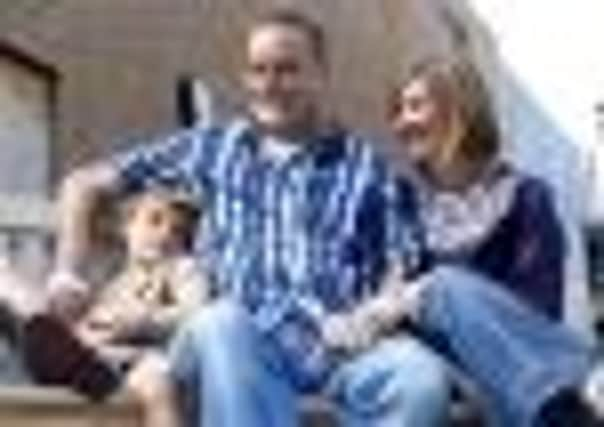I’m looking forward to seeing my son, says dad, 40, with UK’s first totally artificial heart


Matthew Green, a research scientist, was today preparing to return to his home in London after undergoing the ground-breaking surgery at Papworth Hospital, near Cambridge.
He had been critically ill, suffering from end-stage failure of both chambers of his heart but the device has bought him vital time while a donor is found and he will now be able to gradually return to a normal life.
Advertisement
Hide AdAdvertisement
Hide AdSpeaking at Papworth Hospital he said: “The main thing is getting home to my wife Gill and five-year-old Dylan - he’s looking forward to getting his dad back.
“Gradually I hope to return to work and to start cycling again as that is my main love.”
The device, which will serve the role of both ventricles and heart valves, was fitted during a six-hour operation last month.
Although similar operations have been carried out in the past, it is the first time a patient has been able to leave hospital thanks to a mobile device which will power the heart.
Advertisement
Hide AdAdvertisement
Hide AdMr Green said: “Two years ago I was cycling nine miles to work and nine miles back every day but by the time I was admitted to hospital I was struggling to walk even a few yards.
“I am really excited about going home and just being able to do the everyday things that I haven’t been able to do for such a long time, such as playing in the garden with my son and cooking a meal for my family.
“I want to thank all the wonderful staff at Papworth Hospital who have been looking after me and who have made it possible for me to return home to my family.”
The SynCardia artificial heart provides a blood flow of up to 9.5 litres, eliminating the symptoms and effects of severe heart failure. It will be powered by a “freedom portable driver”, worn like a backpack or shoulder bag.
Advertisement
Hide AdAdvertisement
Hide AdMr Green suffered from arrhythmogenic right ventricular cardiomyopathia, a heart muscle disease which results in arrhythmia, heart failure and sudden death.
Steven Tsui, consultant cardiothoracic surgeon and director of the transplant service, said: “At any point in time there may be as many as 30 people waiting for a heart transplant on our waiting list at Papworth, with one third waiting over a year.
“Matthew’s condition was deteriorating rapidly and we discussed with him the possibility of receiving this device, because without it he may not have survived the wait until a suitable donor heart could be found for him.
“The operation went extremely well and Matthew has made an excellent recovery. I expect him to go home very soon, being able to do a lot more than before the operation with a vastly improved quality of life, until we can find a suitable donor heart for him to have a heart transplant.”
Advertisement
Hide AdAdvertisement
Hide AdPapworth Hospital is the only centre in the UK allowed to implant this type of device.
In November 1986, a patient received a Jarvik-7 artificial heart and was supported for two days before undergoing a heart transplant.
Professor Peter Weissberg, medical director at the British Heart Foundation, said: “For some patients with severe heart failure transplantation is their only hope of long-term survival, but donor hearts are not always available.
“Previous versions of the mechanical heart have supported only the left side of the heart - the side that does most of the work - but the total mechanical heart replaces both sides and so can be used for anyone with severe heart failure.
Advertisement
Hide AdAdvertisement
Hide Ad“Patients with mechanical hearts must remain permanently linked to a power supply via tubes that pass through the skin, which is a potential source of infection.
“With this artificial heart, the power supply is small enough to fit in a shoulder bag so patients can walk around and go home.”
Mr Tsui said the device cost £100,000 to install and about £20,000 a year to maintain. Because of the size of the replacement heart, it can only be fitted on people with large heart cavities.
He said: “It would not be possible on all people but, when suitable, it is a medium-term solution which buys us time when looking for a transplant.
“We’re delighted this has been a success and we are delighted Matthew and his family will be able to return to something close to normality.”